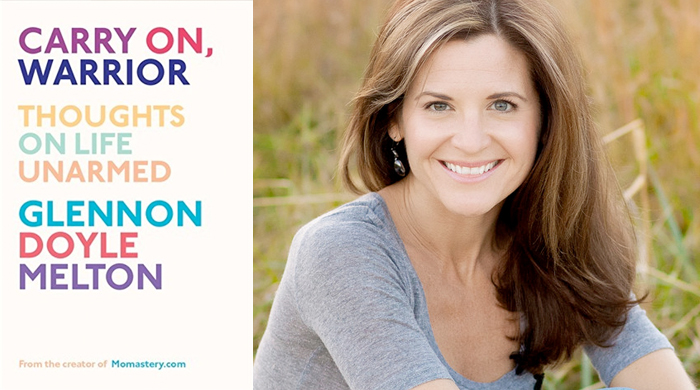Glennon Doyle Melton has two God-given gifts: storytelling and shamelessness. Or so she declares early in her memoir, “Carry On, Warrior: Thoughts on Life Unarmed.”
“I decided that’s what God wanted me to do,” she writes. “He wanted me to walk around telling people the truth. No mask, no hiding, no pretending. That was going to be my thing. I was going to make people feel better about their insides by showing them mine.”
She then spends the rest of the book’s 266 pages putting her imperfections on display for our edification. We learn that she can’t cook and in fact has no pans. She’s inept at laundry, vacuuming and lunch packing. She’s done time and is recovering from years of drug and alcohol abuse and bulimia. Her criminal record gets her summarily rejected by adoption agencies and volunteer organizations worldwide. And her husband, worn out by such scrutiny and rebuffs, sometimes wonders if the children they already have might one day be taken from them.
Some of these revelations are hilarious. Others are disturbing. The result is a disjointed, uneven reading experience in which the texture and complexity of a life is addressed but not defined, and mined but not illuminated.
This memoir, which brings new meaning to the phrase “keeping it real,” is unlike anything I’ve ever read. Regular readers of Melton’s Momastery.com blog will no doubt take her frankness in stride. But as a new reader, it was jarring to see the intimate details of other people’s lives brought into her “reckless truth telling” crusade. I was distracted by concerns about how her writing was affecting those she wrote about. The breadth of her disclosures related to her family—her sister’s divorce, her young son’s sexuality, her husband’s infidelity—was too much for me.
Personal stories undoubtedly have public relevance and every woman should feel empowered to speak her truth. Yet too much of this book skirted lines a memoir shouldn’t cross: Exhibitionism for exhibitionism’s sake, moralizing, self-absorption and DIY therapy.
While Melton’s blog-adapted writing style and self-deprecating sense of humor can be charming in moderation, “Carry On, Warrior” missed an opportunity to distinguish itself as a book. As assembled, the chapters (a combination of blog post reprints and new essays) carried too much of the web’s informality into print, and the freshness of the blog posts paled on the page. The solidity of the book form begged for deeper contemplation, sharper perspective and some connective tissue.
I hesitated to write out these criticisms, influenced by the book’s relentlessly nonjudgmental stance. But then I recalled this wise passage: “Humility is how I survive praise and criticism of my writing, ideas, and beliefs,” Melton writes. “Because I remember that neither praise nor criticism is really about me. We are all just trying to find the truth. So I try to see different points of view not as reasons to step back further into my corner, but as opportunities to take baby steps toward the middle of the ring–if for no other reason than to see my opponent a little closer. That perspective change is usually all it takes to remember that I have no opponents other than my pride.”
Given that sentiment, I now can think of myself as less a hater than a perspective changer. I can crown myself a truth teller, too.


